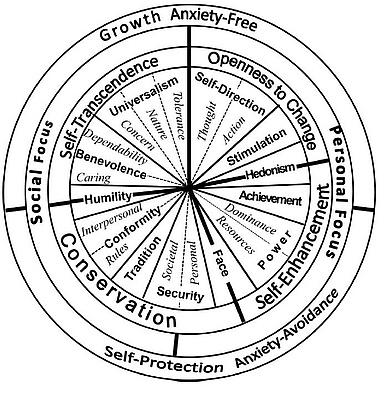Community interest versus self-interest,
or “I” versus “We”

Reconciling the tension between one’s own interests and the common interests of one’s community (family, friends, work, society, etc.) is a basic human task for securing social functioning.
In an extreme and simplified fashion, “I” (self-interest) means pursuing one’s own goals without considering the interests of others, whereas “We” (community interest) means pursuing goals that are important and valuable for the community even if they may partly conflict with one’s own interests.
Values related to “I” versus “We” interests can be expressed in different ways. We rely here on the value system developed by Shalom Schwartz (see e.g. Schwartz et al. (2012). “Refining the theory of basic individual values”. Journal of Personality and Social Psychology, 103, 663-688). Schwarz identifies a total of nineteen values, derived from three universal requirements of human existence: the needs of the individual as a biological organism; the need to coordinate social interactions; and the needs of the group/community for survival and well-being. These values are organized into a circular motivational model with the axes of self-protection vs. growth, and personal versus social focus. While Schwartz regards this value system as universal and supports this hypothesis with empirical studies, there are nevertheless differences in the extent to which specific values are endorsed by members of a society or by different societies.
This subgroup studies how “I” and “We” values are represented in official documents, how these values are put into practice in different societal groups, whether there is agreement between societal groups on these values, and how acceptance of these values is influenced by “perspective”, i.e. whether one is the proponent of certain values or the recipient of the corresponding messages.
